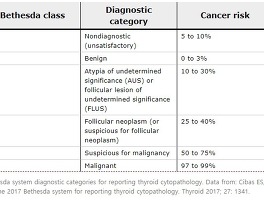분화 갑상선암 환자에서 갑상선 절제술 후 방사선요오드 치료 여부 결정은 다음과 같은 임상병리학적 특징에 근거합니다.
ATA risk stratification system to estimate risk of persistent/recurrent disease

ATA: American Thyroid Association;131I: iodine-131.
* Proposed modifications, not present in the original 2009 initial risk stratification system.
Reproduced with permission from: Haugen BR, Alexander EK, Bible KC, et al. 2015 American Thyroid Association Management Guidelines for Adult Patients with Thyroid Nodules and Differentiated Thyroid Cancer. Thyroid 2016; 26:1. Copyright © 2016 Mary Ann Liebert, Inc.
Characteristics according to the ATA risk stratification system and AJCC/TNM staging system that may impact postoperative radioiodine decision-making
|
ATA risk staging (TNM) |
Description |
Body of evidence suggests RAI improves disease specific survival? |
Body of evidence suggests RAI improves disease free survival? |
Postsurgical RAI indicated? |
|
ATA low risk T1a N0, Nx M0, Mx |
Tumor size ≤1 cm (uni- or multifocal) |
No |
No |
No |
|
ATA low risk T1b, T2 N0, Nx M0, Mx |
Tumor size >1 to 4 cm |
No |
Conflicting observational data |
Not routine* — May be considered for patients with aggressive histology or vascular invasion (ATA intermediate risk). |
|
ATA low to intermediate risk T3 N0, Nx M0, Mx |
Tumor size >4 cm |
Conflicting data |
Conflicting observational data |
Consider* — Need to consider presence of other adverse features. Advancing age may favor RAI use in some cases, but specific age and tumor size cutoffs subject to some uncertainty.¶ |
|
ATA low to intermediate risk T3 N0, Nx M0, Mx |
Microscopic ETE, any tumor size |
No |
Conflicting observational data |
Consider* — Generally favored based on risk of recurrent disease. Smaller tumors with microscopic ETE may not require RAI. |
|
ATA low to intermediate risk T1-3 N1a M0, Mx |
Central compartment neck lymph node metastases |
No, except possibly in subgroup of patients ≥45 years of age (NTCTCSG Stage III) |
Conflicting observational data |
Consider* — Generally favored, due to somewhat higher risk of persistent or recurrent disease, especially with increasing number of large (>2 to 3 cm) or clinically evident lymph nodes or presence of extranodal extension. Advancing age may also favor RAI use.¶ However, there is insufficient data to mandate RAI use in patients with few (<5) microscopic nodal metastases in central compartment in absence of other adverse features. |
|
ATA low to intermediate risk T1-3 N1b M0, Mx |
Lateral neck or mediastinal lymph node metastases |
No, except possibly in subgroup of patients ≥45 years of age |
Conflicting observational data |
Consider* — Generally favored, due to higher risk of persistent or recurrent disease, especially with increasing number of macroscopic or clinically evident lymph nodes or presence of extranodal extension. Advancing age may also favor RAI use.¶ |
|
ATA high risk T4 Any N Any M |
Any size, gross ETE |
Yes, observational data |
Yes, observational data |
Yes |
|
ATA high risk M1 Any T Any N |
Distant metastases |
Yes, observational data |
Yes, observational data |
Yes |
AJCC: American Joint Committee on Cancer; ATA: American Thyroid Association; ETE: extrathyroidal extension; NTCTCSG: National Thyroid Cancer Treatment Cooperative Study Group; RAI: radioiodine; Tg: thyroglobulin; US: ultrasound.
* In addition to standard clinicopathologic features, local factors such as the quality of preoperative and postoperative US evaluations, availability and quality of Tg measurements, experience of the operating surgeon, and clinical concerns of the local disease management team may also be considerations in postoperative RAI decision-making.
¶ Recent data from the NTCTCSG have suggested that a more appropriate prognostic age cutoff for their and other classification systems could be 55 years, rather than 45 years, particularly for women.
Reproduced with permission from: Bryan RH, Alexander EK, Bible KC, et al. 2015 American Thyroid Association Management Guidelines for Adult Patients with Thyroid Nodules and Differentiated Thyroid Cancer: The American Thyroid Association Guidelines Task Force on Thyroid Nodules and Differentiated Thyroid Cancer. Thyroid 2016; 26:1. Copyright © 2016 Mary Ann Liebert, Inc. Publishers. All rights reserved.
REF. UpToDate 2019.12.25


